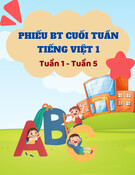
PHÒNG GD&ĐT THỊ XÃ ĐÔNG TRIỀU
TRƯỜNG THCS NGUYỄN ĐỨC CẢNH
ĐỀ CƯƠNG ÔN TẬP HỌC KÌ II
MÔN TIẾNG ANH 9 (HIỆN HÀNH)
NĂM HỌC 2023-2024
A. THEORY:
I. Vocabulary: Unit 6,7
II. Grammar notes:Adjectives and adverbs:
1.Adjectives:
+ Chức năng :dùng để bổ nghĩa cho danh từ hoặc đại từ
Ex : Lan is a naughty girl . She strange talk to her friends .
+ Vị trí: Đứng trước danh từ, đứng sau ( to be)
Ex: Mai is an excellent student . She is very good.
2. Adverbs:
a. Adverbs of frequency:
[ always, usually, often, sometimes, occasionally, rarely ( sedom), never ]
+Chức năng: diễn tả hành động theo thói quen hàng ngày, thường dùng ở
thì hiện tại đơn
Ex :We usually go to Da Lat in the summer.
+ Vị trí : đứng trước động từ thường , đứng sau ( to be)
Ex: You never believe me . You are always angry with me
b. Adverbs of manner:
[ Được cấu tạo từ một tính từ thêm đuôi “ LY”]
+ Một sô tính từ thường dùng :
Adjectives Adverbs Adjectives Adverbs
- beautiful - beautifully - happy - happily
- difficult - difficultly - busy - busily
- slow - slowly - noisy - noisily
- bad - badly - lucky - luckily
- interesting - interestingly - easy - easily
- sudden - suddenly - hungry - hungrily
- strange - strangely - hard - hard
- extreme - extremely - fast - fast
- wram - warmly - good - well
+ Chức năng: diễn tả mức độ hành động , bổ nghĩa cho động từ thường
+ Vị trí : đứng sau động từ thường
Lan is a good student . She studies very well
3. Adverb clause of reasons:
+ Mệnh đề phó từ chỉ lý do là mệnh đề phụ để trả lời câu hỏi với ( Why?)
, mệnh đề này thường bắt đầøu bằng các liên từ :
[ As , because , since ] + S + Verb
Ex : Lan didn’t go to class yesterday because she was very sick .
4. Adjectives + that – clause : ( Tính từ đặt sau là một mệnh đề danh từ )
S + BE + Adjective + that + S + Verb
Ex : I am happy that you won the first prize in English speaking contest
5. Con ditional sentenses – Type 1

+ Câu điều kiện loại 1 dùng để diển tả 1 khả năng có thể xảy ra hoặc thành
hiện thực ở hiện tại hoặc tương lai .
IF CLAUSE MAIN CLAUSE
1. Hiện tại đơn
2. Hiện tại tiếp diển
3. Hiện tại hoàn thành
can
+ S + will + Bare Infinitive
may
Ex: If it is fine tomorrow , we will go for a picnic
We may visit our old teacher if we have finished our work.
You can go out if your father is sleeping .
6. Connectives : ( Từ nối câu)
a. Coordinating conjunctions ( liên từ kết hợp)
+ AND : nối thêm ý vào mệïnh đề trước nó
+ BUT : đưa ra một ý tương phản với mệnh đề trước nó
+ FOR : đưa ra một lý do giải thích cho hành động ở mệnh đềø trước
+ OR : noPi lên sự lựa chọn
+ SO : đề cập đến kết quả của haUnh động ở mệnh đề trước
Ex: - Lan is sick and she can not go to school
but she can go to school
for she was in the rain all day
or she is not fine today.
so she has to stay in bed .
b. Transition words: ( Từ chuyển ý) – dùng để nối 2 ý liên quan lại với nhau
+ Moreover - Furthermore ( hơn nữa) Dùng để thêm thông tin cho ý thưP nhất
Ex: This bike is very beautiful , moreover , it wasn’t expensive.
+ However - Nevertheless : ( mặc dù , tuy vậy ) dùng để diê^n tả ý ngược với
ý thưP nhất.
Ex: The weather is very beautiful today ; however , I don’t like to go for a
picnic.
+ Therefore – Thus : ( do vậy) nói lên kết quả của ý thứ nhất
Ex: the weather was too bad ; therefore, we decided not to go for a picnic
c. Phrasal verbs ( Động từ ghép) là động từ với một giới từ
Một số động từ ghép thường dùng :
[ look at : nhìn vào ; look for : đi tìm ; look after : trông coi , chăm sóc ; look
up : tra cứu ;
Turn on : mở ; turn off: tắt ; turn up ; turn down ; put on : đặt vào ; put
off :dời đi… ]
d. Making Suggestion: ( Cách nói câu đề nghị )
a. S + Suggest + V-ing
Ex: I suggest going to the restaurant .
b. S Suggest + that + S + should + V ( Infinitive)
Ex: I suggest that we should go to the restaurant .
c. Why don’t we + V ( infinitive) …?
Ex: Why don’t we go to the restaurant ?
d. Shall we / Let’s + V ( Infinitive )
Ex: Shall we go to the restaurant ? + = Let’s go to the restaurant.

e. What about / How about + V- ing? Ex : What about going to the
restaurant ? = How about going to the restaurant ?
II. Practice
Exercise 1: Choose the word in each group that has underlined part pronounced
differently from the rest.
1.a.recent b. efficient c. faucet d. crack
2.a. bath b. worth c. them d. thing
3.a. bulb b. consumer c. plumber d. luxury
4.a. crack b. nuclear c. faucet d. c ar
5.a.chopstick b. scheme c. each d. chair
6.a. hobby b. solid c. model d. innovate
7.a. cheap b. nuclear c. heat d. clean
Ex2: Choose the best answer.
1/ You should take garbage to the …………..
A. city B. sea C. countryside D. garbage dump
2/ I went to bed early …….I was tired .
A. If B. since C. so D. however
3/ He….that we should turn off the faucet after using
A. suggests B. told C. asked D. say
4/ Ba is ………..to get a bad mark
A. happy B . happily C. unhappily D. sad
5/ …..air is an important problem we have to solve .
A. polluting B. pollution C. polite D. polluted
6/ I’ll go to the movie ………I buy a ticket .
A. so B. if C. since D. so that
7/ You should………..the fan when you go out .
A. Turn B. turn off C. turn on D. turning on
8/ Mai ….to bed if she doesn’t finish her home work.
A. Will go B. goes C. won’t go D. would go
9/ Why don’t we use public buses …motorbikes ?
A. Instead for B. replacing C. in spite of D. instead of
10/ They ……..abroad if they saved enough money .
A. went B. will go C. would go D. wouldn’t go
11/ We must keep our environment ……………..
A. Unpolluting B. polluted C. unpollution D. unpolluted
12/ We’ll live healthier life ….we keep our environment clean.
A. whether B. as if C. if D. therefore
13/ ….he had no money for the bus , he had to walk all the way home .
A. thus B. besides C. because D. if
14/Air and water are …in our life .
A. Unnecessary B. necessities C. unnecessity D. necessary
15/I know this painting is forgery..I know who paint it
A.but B. and C. however D. or
16/ My father is on holiday ……..he is unable to attend the meeting .
A. and B. but C. so that D. there fore
17/ People should use solar energy ….it is effective .
A. because B. therefore C. but also D. unless

18/ I understand your point of view ….I don’t agree with it .
A. Moreover B. and C. unless D. however
19/They …not throwing trash on to the water surface
A. Suggested B asked C. advice D. suggestion
20/ You remember to turn .. the light before going out.
A. up B. for C. off D. on .
Exercise 3: Supply the correct verbs form
1. The teacher ( explain) that exercise to you if you (ask) her.
2. If Nam (see)Miss Mai, he( give) her your message.
3. I suggest ( join) them on the trip to the mountains.
4. I suggest that you should ( open ) the windows for more fresh air.
5. They suggest ( not throw )trash on to the water surface .
Exercise 4: Rewrite the following sentences. Using the words in brackets.
1/ I was tired. I went to bed early.( because) …………………………………………..
2/ I suggest we should save water in our school. ( suggest + V- ing)
……………………………………….
3/ Nam didn’t study hard. He failed the exam. ( since)
………………………………………………
4/ I think we should use energy- saving bulbs. ( suggest + that + S + …)
………………………………………
5/ Last night, I was tired. I went to bed early.( so)
………………………………………….
6. Ba failed the English test. He has to do the test again (Therefore )
Exercise 5. Use the words given to write a speech.
* Saving energy in your class.
- turn off the light after using.
- open the window instead of turning on the lights .
- Turn off the fans when it’s cold.
Exercise 6: Write complete sentences, using the words given.
1) If/ people/ stop/ use/ dynamite/ for/ fish/ lot/ fish/ sea creatures/ be/ good/ preserve.
2) I/ suggest/ that/ you/ collect/ bags/ take/ garbage dump.
3) I/ want/ use/ solar energy/ but/ I/ not have/ enough money/ buy/ necessary
equipment.
4)I/ be/ surprise/ that/ people/ walk/ grass/ but/ no one/ tell/ them/ it.
5) Minh/ answer/ very soft/ so/ teacher/ not hear/ her/ clear.
Exercise 7: Choose the word or phrase (a, b, c or d) that best fits the blank space
in the following passage.
Most of the energy we use today (1)…………. from coal, oil and gas. But these will
not last forever, and burning them is slowly harming the (2)……….We need to (3)
………other ways of supplying energy. Solar Power is a way of using the (4)
………….. energy as heat or to make electricity. We can also use wind-power by
building modern (5)………..that spin in the wind. There are several types of water-
power: river water in mountainous areas can (6)……… to generate hydroelectric
power, and we can also create electricity (7)………. seawater flowing in and out with
the (8)………._______
1. a. makes b. creates c. comes d. begins
2. a. soil b. atmosphere c. water d. resources

3. a. look after b. look into c. look at d. look for
4. a. sun’s b. moon’s c. star’s d. earth’s
5. a. windbreaks b. windmills c. wind tunnels d. wind chimes
6. a. use b. using c. be used d. to use
7. a. in b. for c. by d. from
8. a. crests b. ways c. waves d. tides
Exercise 8: Read the passage below and then decide whether the statements that
follow are True or False.
Many people now think that teachers give students too much homework. They say that
it is unnecessary for children to work at home in their free time. Moreover, they argue
that most teachers do not properly plan the homework tasks they give to students. The
result is that students have to repeat tasks which they have already done at school.
Most people agree that homework is unfair. A student who can do his homework in a
quiet and comfortable room is in a much better position than a student who does his
homework in a small, noisy room with the television on. Some parents help their
children with their homework. Other parents take no interest at all in their children’s
homework.
It is important, however, that teachers talk to parents about homework. A teacher
should suggest suitable tasks for parents to do with their children. Parents are often
better at teaching their own children!
9. Many parents would like their children to have less homework.
10. Parents think that students should do a lot of work in their leisure time at home.
11. A lot of homework has not been planned properly, according to many
12. Only a small number of people think that homework is fair.
13. Teachers suggest parents should teach their own children at home.



![Tài liệu tham khảo Tiếng Anh lớp 8 [mới nhất/hay nhất/chuẩn nhất]](https://cdn.tailieu.vn/images/document/thumbnail/2025/20250806/anhvan.knndl.htc@gmail.com/135x160/54311754535084.jpg)










![Phiếu bài tập cuối tuần Tiếng Việt 1 tuần 2 đề 2: [Hướng dẫn chi tiết]](https://cdn.tailieu.vn/images/document/thumbnail/2025/20250728/thanhha01/135x160/42951755577464.jpg)

